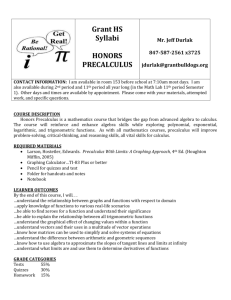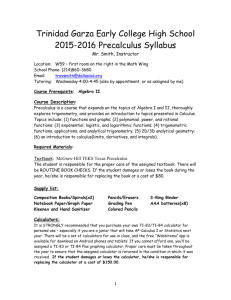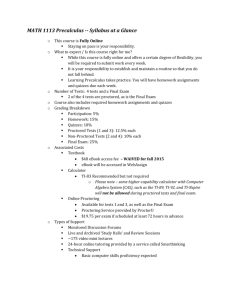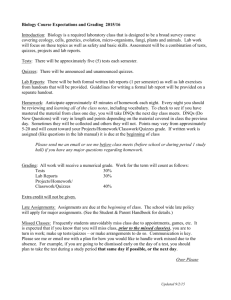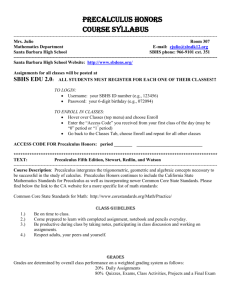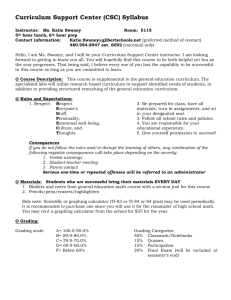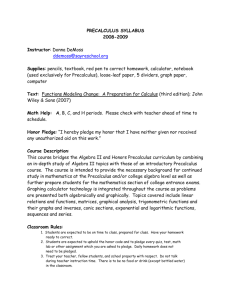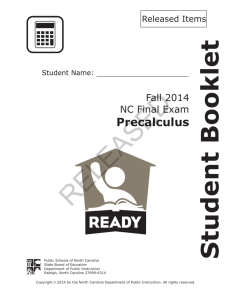Precalculus Course Syllabus
advertisement
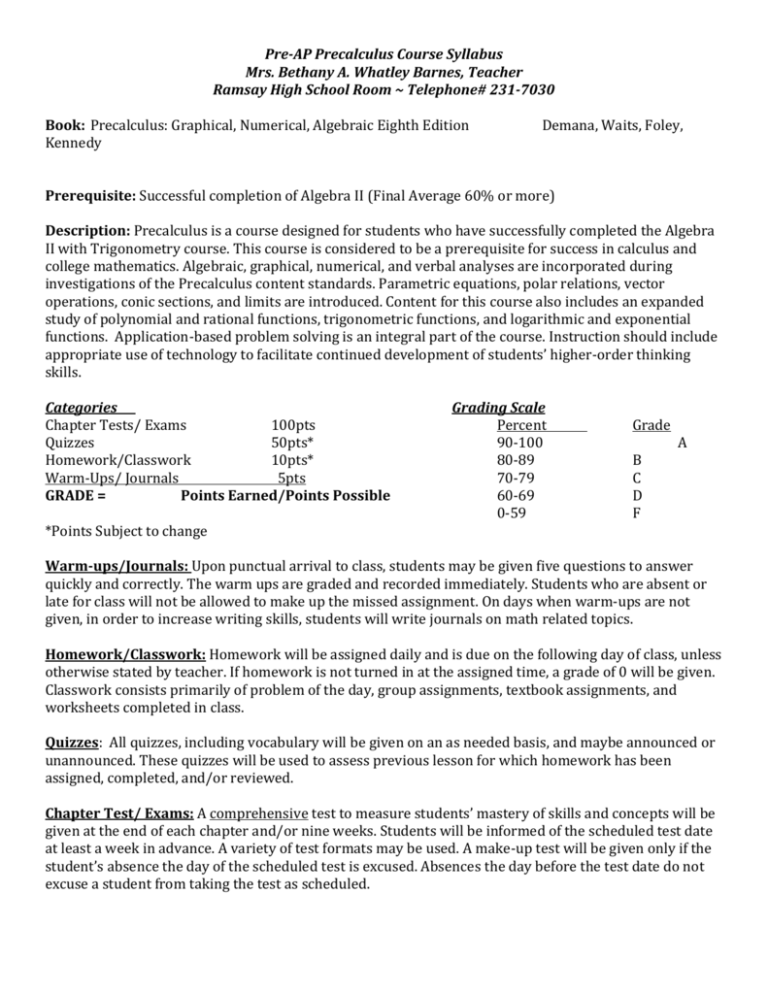
Pre-AP Precalculus Course Syllabus Mrs. Bethany A. Whatley Barnes, Teacher Ramsay High School Room ~ Telephone# 231-7030 Book: Precalculus: Graphical, Numerical, Algebraic Eighth Edition Kennedy Demana, Waits, Foley, Prerequisite: Successful completion of Algebra II (Final Average 60% or more) Description: Precalculus is a course designed for students who have successfully completed the Algebra II with Trigonometry course. This course is considered to be a prerequisite for success in calculus and college mathematics. Algebraic, graphical, numerical, and verbal analyses are incorporated during investigations of the Precalculus content standards. Parametric equations, polar relations, vector operations, conic sections, and limits are introduced. Content for this course also includes an expanded study of polynomial and rational functions, trigonometric functions, and logarithmic and exponential functions. Application-based problem solving is an integral part of the course. Instruction should include appropriate use of technology to facilitate continued development of students’ higher-order thinking skills. Categories Chapter Tests/ Exams 100pts Quizzes 50pts* Homework/Classwork 10pts* Warm-Ups/ Journals 5pts GRADE = Points Earned/Points Possible *Points Subject to change Grading Scale Percent 90-100 80-89 70-79 60-69 0-59 Grade B C D F A Warm-ups/Journals: Upon punctual arrival to class, students may be given five questions to answer quickly and correctly. The warm ups are graded and recorded immediately. Students who are absent or late for class will not be allowed to make up the missed assignment. On days when warm-ups are not given, in order to increase writing skills, students will write journals on math related topics. Homework/Classwork: Homework will be assigned daily and is due on the following day of class, unless otherwise stated by teacher. If homework is not turned in at the assigned time, a grade of 0 will be given. Classwork consists primarily of problem of the day, group assignments, textbook assignments, and worksheets completed in class. Quizzes: All quizzes, including vocabulary will be given on an as needed basis, and maybe announced or unannounced. These quizzes will be used to assess previous lesson for which homework has been assigned, completed, and/or reviewed. Chapter Test/ Exams: A comprehensive test to measure students’ mastery of skills and concepts will be given at the end of each chapter and/or nine weeks. Students will be informed of the scheduled test date at least a week in advance. A variety of test formats may be used. A make-up test will be given only if the student’s absence the day of the scheduled test is excused. Absences the day before the test date do not excuse a student from taking the test as scheduled. Missed Assignments: Students will be permitted to make up missed assignments only if their absence from class is excused. An excused absence does not mean the student is excused from completing the assignment, only that the assignment can be made up. The student will be given three days to make-up any missed assignments unless other arrangements have been made with the teacher. Students must take the initiative to determine what assignments have been missed and schedule a time after school to take missed tests or quizzes. Students will not be allowed to make up quizzes or tests missed due to an unexcused absence. Students will not be allowed to makeup quizzes or tests during class time. Progress Reports/ Report Cards: All students will be issued a progress report at 4½ weeks and a report card at 9 weeks. Attendance: Attendance is taken daily. Tardiness is noted. Excessive (excused and unexcused) absences from a class may result in a loss of credit. Attendance in class is imperative. When a student misses class, they miss the opportunity to listen to the teacher and discuss the concepts that are being learned. It is then the student’s responsibility to come to tutoring or learn the material independently. They also miss the opportunity to participate in group and class activities. Therefore, students should limit the number of field trips, activities, and absences that keep them away from class. Tutoring: Tutoring will be provided and is available on an as needed basis. Tutoring times will vary and will be announced at a later date. Tutoring attendance will be noted by the teacher. Honor Code: Every student is expected to abide by the Ramsay High School Honor Code. This includes homework, quizzes, tests, and any other assignment given by the teacher. No credit will be given on any assignment where a violation of the honor code has occurred. See Ramsay’s Parent-Student Handbook for more details about the Honor Code. Personal Materials/Supplies Needed Daily: 1.) Textbook 4.)Loose Leaf Paper Pencils 7.) Color Pencils 2.) Graph Paper 5.) 1 Dry Erase Marker 8.) Graphing Calculator 3.) Binder with Dividers 6.) 1Subject Note book/Composition book/or Folder with fasteners Classroom Rules Always obey the Student Code of Conduct approved and provided by the Birmingham Board of Education. Always be on time and prepared for class. Do all assignments and turn every assignment in on time. Always ask a question if you do not understand what is being asked of you. Respect others and their property. Treat others and their property as you would want to be treated. Use a pencil to complete all assignments. Wait to be recognized before speaking and always get permission before leaving seat. Keep the area around you clean at all times. Leave all food items (candy, gum, chips, drink) in your locker. Leave your book bags in your locker. AGREEMENT Student I have read and understand the syllabus and what is expected of me in Mrs. Whatley-Barnes Precalculus Class. If I have any questions I will not hesitate to ask. ___________________________________________________ Student’s Signature Teacher I will teach PreCalculus and try my best to make sure every student understands the concepts taught. I will be supportive and will make myself available to the student as well as the parent by way of phone or conference for any questions or concerns that may arise. ___________________________________________________/231-7030 Teacher’s Signature Parent As your child’s PreCalculus teacher, I am willing to take the proper steps to ensure your child is working to his/her full potential. In order to do so, there needs to be a strong communication network. First, please feel free to call (231-7030) or schedule a conference with me during the school day regarding your child’s performance in class through the counselor’s office. In addition, please check below all the following for which you would like to be contacted and a number you can be reached during 8:15 a.m. and 9:45 a.m. Please check all that apply. ____ When my child improves on homework. ____ When my child improves on quizzes. ____ When my child performs poorly on a test. ____ When my child improves on tests. ____ When my child misses an assignment ____ When my child is absent from class. ____ When my child shows behavior problems ____ When my child’s average drops below a ______. I have read and understand the syllabus and what is expected of my child in Mrs. Whatley-Barnes PreCalculus class. I will be supportive to both my child and Mrs. Whatley-Barnes. If I need to be reached by Mrs. Whatley-Barnes, she may contact me at the number and time listed below. Parent/Guardian’s Name (Please Print) __________________________________________ ___________________________________________________ Parent’s Signature Number __________________________________ Best time to call this number ________________ Number __________________________________ Best time to call this number ________________ Precalculus Syllabus Section 1.1 – Rectangular Coordinates Section 1.2 – Introduction to Graphing Equations Section 1.3 – Symmetry; Graphing Key Equation: Circles Section 1.4 – Solving Equation Section 1.5 – Solving Inequalities Section 1.6 – Lines Chapter 1 Test Section 2.1 – Functions Section 2.3 – Properties of Functions Basic Graphs & Transformations Section 2.4 – Piecewise-defined Functions Section 2.5 Graphing Techniques Section 2.6 – Operations on Functions Chapter 2 Test Section 3.4 – Rational Functions I Sections 3.5 – Rational Functions II Section 4.1 – One-to-One Functions: Inverse Functions Section 4.2 – Exponential Functions Section 4.3 – Logarithmic Functions Section 4.4 – Properties of Logarithms Section 4.5 – Logarithmic and Exponential Equations Section 4.6 – Compound Interest Section 4.7 – Growth and Decay Section 4.8 – Exponential, Logarithmic, and Logistic Models Section 2.2 – Linear Functions and Models Section 3.1 – Quadratic Functions and Models Chapter 4 Test Section 5.1 – Angles and their Measures Section 5.2 – Trigonometric Functions Section 5.3 – Properties of Trigonometric Functions Graph Basic Trigonometric Functions Section 5.4 – Graphs of the Sine and Cosine Functions Section 5.5 – Graphs of the Tangent, Cotangent, Cosecant, and Secant Functions Section 5.6 – Phase Shift Chapter 5 Test/9 Weeks Exam
